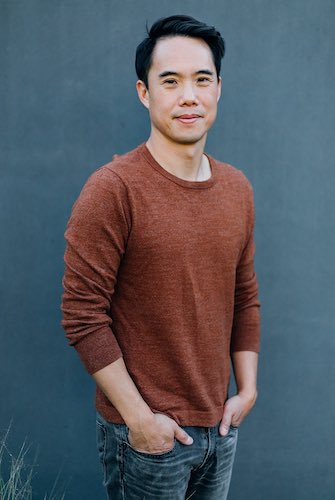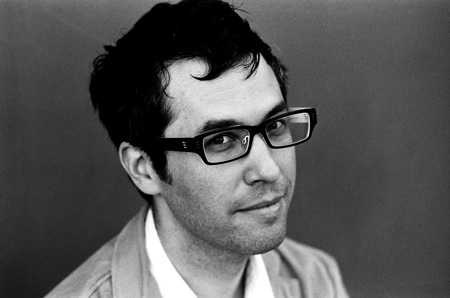 Before Adam Rex stays at your house, prepare for the sinking feeling of creative inadequacy. Because in the morning while you’re dozing in bed, possibly fighting off a hangover, you’ll find that Adam has been up for hours, quietly sketching out another fantastic tale of time travel or a scene in which a knight punches his queen in the nose. The worst part of all is that when you ask what he’s been working on, he’s happy to share it with you. He doesn’t need to be cagey about ideas, because he’s got a hundred more where those came from.
Before Adam Rex stays at your house, prepare for the sinking feeling of creative inadequacy. Because in the morning while you’re dozing in bed, possibly fighting off a hangover, you’ll find that Adam has been up for hours, quietly sketching out another fantastic tale of time travel or a scene in which a knight punches his queen in the nose. The worst part of all is that when you ask what he’s been working on, he’s happy to share it with you. He doesn’t need to be cagey about ideas, because he’s got a hundred more where those came from.
Adam and his wife Marie are close family friends, so over the years I’ve enjoyed picking his brain about young adult fiction as a genre, and how maddening it is that everyone seems to think they have what it takes to write a successful YA novel. For his part Adam doesn’t seem to get too riled about it. After all, he’s accustomed to hearing similar assumptions about the ease of writing picture books, which he did with great success (his first, Frankenstein Makes a Sandwich, from Harcourt Children’s Books, was a New York Times Bestseller) before tackling his first novel, an alien invasion road trip tale (The True Meaning of Smekday, from Hyperion). In a realization of every writer’s secret fantasy, that book was optioned by Dreamworks and will be released as a feature film in 2014. He followed that up with the “Never Coming of Age” teen novel Fat Vampire (Balzer + Bray), and at the moment he’s steadily working through the Cold Cereal saga (also by Balzer + Bray), aimed at a middle-grade audience.
As if that isn’t enough to keep him busy, Adam also continues to work as an illustrator, not only for his own books but also for big names like Mac Barnett and Neil Gaiman. He was kind enough to take a break and talk to me about the role of YA fiction in contemporary literature, writing through uncertainty, and how to turn a bad tattoo into a good novel. And in case you were wondering, that is his real name.
Interview
Katherine Carlson: What about writing for a younger audience appeals to you?
Adam Rex: There are a lot of things—kids are obsessive about their books, for example—but definitely among these is the fact that, while I seem to read a little of everything, I only ever write genre stories. Maybe that’ll change; I don’t know. But genre books are far less ghettoized in kid literature than they are in adult. So I can write my funny alien invasions or my leprechauns hiding out in Port Authority restrooms and still reach a wide swath of kid readers (and their parents, for that matter), whereas if I wrote for adults I’d have to hope to become that one-in-a-thousand Kurt Vonnegut type who can write his sci-fi and still get shelved in General Fiction.
Now, I think these fences have been getting trampled more and more lately, so maybe we’re approaching a time in which everybody’s mom reads Tolkien and everybody’s dad reads Austen. I don’t know. Mine don’t, anyway.
To play devil’s advocate, sci-fi and fantasy have a huge built-in audience of voracious readers you don’t necessarily get in other categories. The literary fiction label might have a more prestigious ring to it, but in practical terms it’s a much harder sell. For example, most male book buyers don’t read fiction at all, but if they do, it’s genre fiction.
That’s probably true. But I think I have to accept my limitations—I don’t write the sorts of stories that the hardcore sci-fi and fantasy fans are necessarily going to like. Neither did Vonnegut, for that matter. I doubt anyone has ever recommended a person read Slaughterhouse-Five based on his love of Heinlein.
I’m a complete genre dilettante. I like the trappings of genre because they’re fun, and have a lot of laugh-with and laugh-at potential. But many of those voracious genre fans you speak of can be deadly serious people.
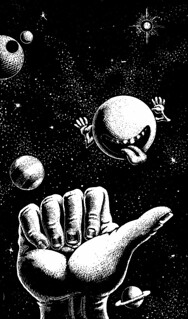 I can’t say to what degree I’m chasing the label of literary fiction, because if I’m honest I have to say I’m really trying to be Douglas Adams or Joss Whedon. Maybe more Whedon, because I love the tension between genuinely funny and deeply sad. I think each heightens and deepens the other, and don’t find them to be so mutually exclusive as some authors do. It’s telling that maybe my closest analog for what I’m trying to accomplish is a guy known for TV and movies, not books. Or that I referenced Adams, whose Hitchhiker’s trilogy I first read when I was eleven, but who never wrote anything that was, strictly speaking, a kid’s book. I’m told I’m writing stories that nine-year-olds like and thirty-nine-year-olds like fairly equally, if they like them at all. So it’s frustrating to me that we have this cultural belief in the all-ages movie or TV show, but not book.
I can’t say to what degree I’m chasing the label of literary fiction, because if I’m honest I have to say I’m really trying to be Douglas Adams or Joss Whedon. Maybe more Whedon, because I love the tension between genuinely funny and deeply sad. I think each heightens and deepens the other, and don’t find them to be so mutually exclusive as some authors do. It’s telling that maybe my closest analog for what I’m trying to accomplish is a guy known for TV and movies, not books. Or that I referenced Adams, whose Hitchhiker’s trilogy I first read when I was eleven, but who never wrote anything that was, strictly speaking, a kid’s book. I’m told I’m writing stories that nine-year-olds like and thirty-nine-year-olds like fairly equally, if they like them at all. So it’s frustrating to me that we have this cultural belief in the all-ages movie or TV show, but not book.
Nine to thirty-nine sounds like a pretty good range. Are you saying that you’ve been told your books would appeal to older readers, but they just don’t find out about them unless they have kids?
Yeah, to be clear—it’s not the range, but the distribution. I have people in their 30s, 40s, 50s reading my books, just not very many. They tell me that they’re mostly teachers, children’s librarians, and parents of school-aged kids, so in part they’re coming to my book out of a sense of duty—they’re caregivers, and they just want to better understand what their kids have been quoting for the past few weeks.
Blame J. K. Rowling for making kids authors think we can have it all. And I want to stress that I like kids, and I like making books that kids like. I think all creative types are trying to plant flags in other people’s minds, to lay claim to real estate in their heads. And one of the great things about kids is that they don’t have a lot of landmarks yet. You can still build the Taj Mahal in there. But nonetheless, I just get a different feeling when a kid tells me she loved my book than I do when a member of my own generation tells me the same thing. And I’m greedy: I want both feelings.
Every Pixar screening has all these childless adults in it. Possibly my favorite Pixar story, The Incredibles, is ostensibly a kid’s movie about a dad going through a mid-life crisis. We have serious discussions about the politics of comic book movies, or whether a film that’s primarily intended to sell toys is nonetheless too intense for kids under eight or nine. These movies are marketed to a wider audience, whereas the all-ages book only ever seems to happen by happy accident. Spinsters are reading Harry Potter! Whole families enjoy The Hunger Games! When it happens it’s actually newsworthy. So whatever—I’m going to keep writing these sorts of stories until we figure this out.
You began your career as a children’s book illustrator, and you’ve written several successful picture books. What made you take the leap of writing a novel?
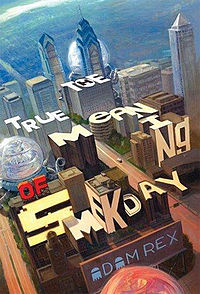 So my first novel, The True Meaning of Smekday, was really just the first novel I finished. I tried to write a few in high school, maybe early college, and always assumed it was something I’d try my hand at some point. But the reason Smekday came about when it did was because I actually tried to write a picture book about colonialism via a funny alien invasion, and it was a really shitty picture book. So I shelved it, and came back to it weeks later when I realized it was actually a novel.
So my first novel, The True Meaning of Smekday, was really just the first novel I finished. I tried to write a few in high school, maybe early college, and always assumed it was something I’d try my hand at some point. But the reason Smekday came about when it did was because I actually tried to write a picture book about colonialism via a funny alien invasion, and it was a really shitty picture book. So I shelved it, and came back to it weeks later when I realized it was actually a novel.
So for a while it was the project I was working on for fun, secretly, when I was neglecting my paid illustration work. And then when I had something like 20,000 words, I showed it to my agent, and he found a publisher that would pay me to finish it. Which was actually kind of terrifying since, as I said, I’d never finished a novel before.
Obviously a book contract is a great motivator, but do you ever create more artificial scenarios for yourself to keep writing?
Nothing motivates me like other people’s expectations: having a wife and an editor and an agent who are all to one degree or another counting on me to keep going. And Marie is an amazing sounding board. Actually that’s not even fair—she gives amazing suggestions, and she’s really helped me feel my way through the trilogy I’m writing now.
Your wife is an astrophysicist. Each of your books contains elements of fantasy and/or sci-fi. Does she ever act as a technical consultant? Do you think a degree of verisimilitude matters to young readers?
Generally I think only internal verisimilitude matters to young readers. Hell, I think that’s all that really matters to most readers regardless of age. Writing your own rules, but being consistent with them. If you’ve established that Luke can move things with his mind, maybe don’t have him close a portcullis by throwing a rock at a button.
What are some of the biggest differences between writing a middle-grade novel versus a novel for teenagers?
I’m always writing for myself, and with my ten or fifteen-year-old self in mind.
Once your audience hits, say, thirteen or fourteen, there’s very little they can’t handle. So why do you think the YA label exists at all? Are there things a YA can get away with that a so-called “adult” book can’t?
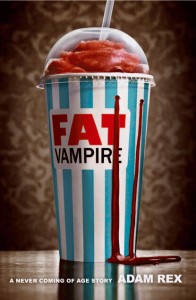 I’m definitely saying that when some kids reach thirteen or fourteen there’s very little they can handle. And there are certainly other kids on a different track, and not every book needs to work for every reader. But to the adult who says that, for example, a story aimed at teens shouldn’t deal with drug abuse, or rape, or god forbid even a healthy sexual relationship, I have to insist that both as writers AND readers we want to be seen, known, understood. There are fourteen-year-old people who deal with hard issues, and they can have their lives saved by the right book. I was going to apologize just now for being trite, but fuck that—it’s true.
I’m definitely saying that when some kids reach thirteen or fourteen there’s very little they can handle. And there are certainly other kids on a different track, and not every book needs to work for every reader. But to the adult who says that, for example, a story aimed at teens shouldn’t deal with drug abuse, or rape, or god forbid even a healthy sexual relationship, I have to insist that both as writers AND readers we want to be seen, known, understood. There are fourteen-year-old people who deal with hard issues, and they can have their lives saved by the right book. I was going to apologize just now for being trite, but fuck that—it’s true.
It used to be that the YA category barely existed. There were certain classics like The Chocolate War or The Catcher in the Rye, but the general thinking seemed to be that all right, you’re fifteen now, you should be reading Steinbeck. Or T. H. White. Or failing that, outside of class, Stephen King. Not many people, even within the industry, really thought that teens needed their own category. That’s what Animal Farm and romances about governesses were for. Lately YA has been shown to have legs, but not simply as an age classification or even a rating. It’s more of a genre unto itself, like chick lit. More likely than not, it has a wistful teenage girl on the cover and contains a lot of mopey smoldering.
Humor is another important component to your work, and it often comes from a fairly dark place. Smekday, for example, could be seen as an absurd allegory for the displacement of the indigenous peoples of the American West. But you could easily ignore that element and still enjoy the story and laugh at silly aliens. How do you walk that line?
Well, I think that’s where a good second reader, whether it be your wife or editor or whoever, is really useful. Smekday in its original conception might have turned out really didactic and awful. Luckily I got distracted by the fun of essentially writing a Hope/Crosby road movie buddy comedy. And at every point I was asking myself, “Do kids need to know what I’m getting at here? If they’re missing the satire will they even realize that they’re missing the satire? If the answer was no, then I was doing it right. I love the idea that a kid might suddenly remember my book two years after reading it, in the middle of History class. Because one of the reasons I wrote Smekday was that I remembered my own struggles as a middle school kid to justify European American behaviors toward Native Americans. I identified with the European Americans, so I wanted to believe that the Indians had it coming somehow. It may be wishful thinking, but I’d love to know that some kid has read my book and thought, “Well if I didn’t think it was okay what the aliens did in Smekday, then maybe it wasn’t okay what Americans did either.” Or the English. Or the Germans or Japanese or Sunnis.
You mentioned that you’re currently writing a trilogy. I’m interested in how you set out planning something like that. How do you maintain suspense while still giving your readers enough satisfaction to want to continue?
Well, here’s where I discovered that my usual fecklessness wasn’t going to cut it. I mean, it has to some degree, because I managed to write and publish the first book, and get halfway through the second, before actually figuring out the overarching plot of the series. I do not recommend that. Halfway through the second book I realized what a hole I’d dug myself, and stopped writing for a couple of weeks while I mapped out the rest of the story on an Excel spreadsheet. I had a different column for each character, and I plotted their progress individually. Certainly if I’d plotted it all out from the start I’d have taken pains not to end up with ten main characters and a cat.
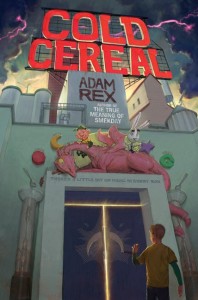 My goal at the end of the first novel [Cold Cereal] was for readers to hope there’d be a second, but at the same time feel satisfied that they’d read something close to a standalone story. Not sure if I succeeded or not. The second book (to be published February 2013) is my favorite thing I’ve ever written, but nonetheless I didn’t worry too much about having it feel self-contained. If you’ve followed me into the second volume, then you’re probably in for the third.
My goal at the end of the first novel [Cold Cereal] was for readers to hope there’d be a second, but at the same time feel satisfied that they’d read something close to a standalone story. Not sure if I succeeded or not. The second book (to be published February 2013) is my favorite thing I’ve ever written, but nonetheless I didn’t worry too much about having it feel self-contained. If you’ve followed me into the second volume, then you’re probably in for the third.
I hate to admit it, but my model for all of this was probably the original Star Wars trilogy. The first story should stand alone pretty well. The second can get significantly darker, and end tenuously. And the third should have Ewoks.
What are some of your favorite YA novels of the last few years?
I really like my friend Mac [Barnett]’s middle-grade mystery novels, The Brixton Brothers mysteries. I illustrate these, so that probably sounds self-aggrandizing, but these books are well constructed and hilarious without any help from me. Rebecca Stead’s When You Reach Me was really satisfying. As was Neil Gaiman’s The Graveyard Book.
But maybe my favorite YA story recently in any medium was Moonrise Kingdom.
You’re still working very actively as a children’s book illustrator and you’ve got back-to-back projects for the next couple years. How on earth do you still find time to write?
I spend too little time on everything and feel terrible about it.
Links & Resources
- See more of Adam Rex’s excellent artwork on his quite hilarious (bonus points!) website: adamrex.com.
- Can’t get enough YA today? We can’t seem to stop either. FWR’s full YA Spotlight coverage is right here.


